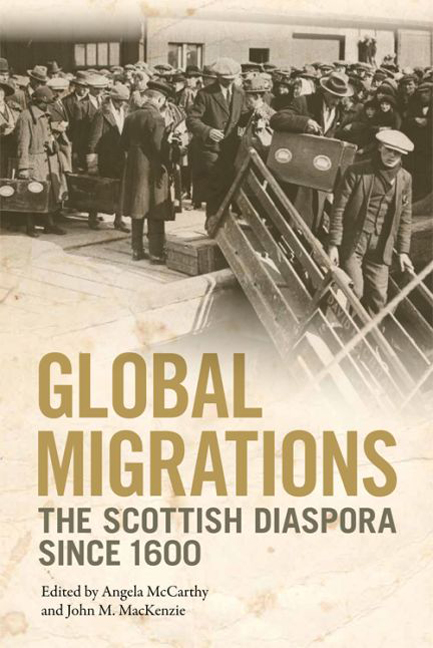Book contents
- Frontmatter
- Contents
- List of Figures and Tables
- Notes on the Contributors
- Acknowledgements
- A Tribute to Sir Tom Devine
- 1 Introduction-Global Migrations: The Scottish Diaspora since 1600
- 2 ‘As Hewers of Wood, and Drawers of Water’: Scotland as an Emigrant Nation, c. 1600 to c. 1800
- 3 ‘You Have Only Seen the Fortunate Few and Draw Your Conclusion Accordingly’: Behavioural Economics and the Paradox of Scottish Emigration
- 4 Scottish Diasporas and Africa
- 5 ‘Have the Scotch no Claim upon the Cherokee?’ Scots, Indians and Scots Indians in the American South
- 6 Conflicts of Interest, Crises of Conscience: Scots and Aboriginal People in Eastern Australia, 1830s–1861
- 7 The Importance of Scottish Origins in the Nineteenth Century: James Taylor and Ceylon Tea
- 8 ‘Our Old World Diff'rences are Dead’: The Scottish Migrant Military Tradition in the British Dominions during the First World War
- 9 ‘Part of my Heritage’: Ladies’ Pipe Bands, Associational Culture and ‘Homeland’ Identities in the Scottish Diaspora
- 10 Understanding Scottishness among Sojourners, Settlers and Descendants in Hong Kong and New Zealand
- 11 Encountering an Imaginary Heritage: Roots Tourism and the Scottish Diaspora
- 12 Home is where the Heart is: Affinity Scots in the Scottish Diaspora
- 13 What Scottish Diaspora?
- 14 Afterword
- Index
7 - The Importance of Scottish Origins in the Nineteenth Century: James Taylor and Ceylon Tea
Published online by Cambridge University Press: 23 September 2017
- Frontmatter
- Contents
- List of Figures and Tables
- Notes on the Contributors
- Acknowledgements
- A Tribute to Sir Tom Devine
- 1 Introduction-Global Migrations: The Scottish Diaspora since 1600
- 2 ‘As Hewers of Wood, and Drawers of Water’: Scotland as an Emigrant Nation, c. 1600 to c. 1800
- 3 ‘You Have Only Seen the Fortunate Few and Draw Your Conclusion Accordingly’: Behavioural Economics and the Paradox of Scottish Emigration
- 4 Scottish Diasporas and Africa
- 5 ‘Have the Scotch no Claim upon the Cherokee?’ Scots, Indians and Scots Indians in the American South
- 6 Conflicts of Interest, Crises of Conscience: Scots and Aboriginal People in Eastern Australia, 1830s–1861
- 7 The Importance of Scottish Origins in the Nineteenth Century: James Taylor and Ceylon Tea
- 8 ‘Our Old World Diff'rences are Dead’: The Scottish Migrant Military Tradition in the British Dominions during the First World War
- 9 ‘Part of my Heritage’: Ladies’ Pipe Bands, Associational Culture and ‘Homeland’ Identities in the Scottish Diaspora
- 10 Understanding Scottishness among Sojourners, Settlers and Descendants in Hong Kong and New Zealand
- 11 Encountering an Imaginary Heritage: Roots Tourism and the Scottish Diaspora
- 12 Home is where the Heart is: Affinity Scots in the Scottish Diaspora
- 13 What Scottish Diaspora?
- 14 Afterword
- Index
Summary
RECENT OVERARCHING STUDIES of the Anglophone world present migrants as an undifferentiated mass, so potentially marginalising their individual ethnicities, cultural influence of the homelands, and their varied engagement with the countries where they settled. In part this reflects many studies of the British Empire which continue to elide ethnic differences, despite John MacKenzie stating that the ‘ethnic mix from the United Kingdom … [is] the great hidden story of imperial rule’. Both MacKenzie and T. M. Devine have sought to rectify this in respect of the Scots. And, as Devine reinforces in a recent global overview of Scottish migration,
individual nations of Britain still do merit specific consideration in their own right as part of the broader British dynamic. This is true in terms of the nature of their emigration, migrant identities and global impact because of the distinctive nature of their own economic, social and intellectual structures.
It is within this context that this chapter examines the life of James Taylor, ‘the Father of the Ceylon tea enterprise’ (Figure 7.1), to examine the importance – or not – of his Scottish background. Later in this book, for instance, David Fitzpatrick argues that ‘home skills were often unexportable’ and ‘background and origin are much less important … than differential opportunities in the host countries’. This chapter disputes that claim and shows the ways in which Taylor's origins were important in his achievements abroad. But why is Taylor a useful case study? First, despite acclaim in his adopted land, he never accumulated vast wealth or recognition in the land of his birth. As he put it in 1874, ‘Some how or other I was born apparently to do good for others without much benefitting myself.’ Taylor therefore enables us to consider the fate of a migrant who had minimal financial assets at the outset of his departure from Scotland at sixteen years of age. Second, a focus on Taylor is facilitated by the serendipitous survival of his correspondence spanning forty years, his published letters and his photograph albums.
- Type
- Chapter
- Information
- Global MigrationsThe Scottish Diaspora since 1600, pp. 117 - 137Publisher: Edinburgh University PressPrint publication year: 2016

